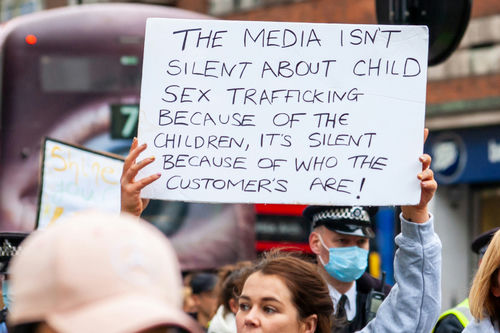Florida’s so-called “sunshine state” just shattered records, but not the kind lawmakers want to brag about: more than 700,000 people were registered as human trafficking victims in 2024, according to a state-commissioned report that exposes the scale of an epidemic fueled by open borders, government incompetence, and a system rigged against everyday Americans.
Florida’s Trafficking Crisis: The Numbers Speak Louder Than Politicians Ever Will
The latest report from the University of South Florida’s Trafficking in Persons (TIP) Lab set off alarm bells statewide: over 700,000 victims of human trafficking in a single year. That’s more than the population of Miami. Of these, 100,000 were children targeted for sexual exploitation, while more than half a million faced labor trafficking—mostly in jobs the political class insists Americans “won’t do.” If that phrase makes your blood boil, it should. This isn’t a victimless crime. It’s a direct consequence of failed border policies and a culture that turns a blind eye to the human cost of “cheap labor” and endless population growth.
The state’s strategic location—with its sprawling coastlines, international airports, and major ports—makes it a natural target for traffickers. But geography isn’t destiny. Leadership is. And for years, that leadership has been more interested in virtue-signaling about “sanctuary” and “diversity” than actually protecting the vulnerable, let alone enforcing the law. The result? An underclass of exploited workers and children, hidden beneath the glossy brochures that sell Florida as paradise.
Who’s Allowing This and Who Pays the Price?
The list of stakeholders reads like a who’s who of agencies and nonprofits: The TIP Lab crunches the numbers, the Department of Children and Families investigates child cases, the Attorney General’s office hosts summits, and local sheriffs launch stings. Each group plays a role, but the system is still failing. The 2024 law designating the TIP Lab as the state’s official data repository was supposed to bring transparency, but all it’s really done is confirm what every concerned Floridian already suspected: the numbers are staggering, and the system is overwhelmed.
Joan Reid, the TIP Lab director, says her team’s job is to “make the hidden and invisible visible.” Well, mission accomplished. Now what? The data shows that counties like Miami-Dade, Broward, and Hillsborough are ground zero for trafficking, thanks to dense populations, tourism, and a constant flow of new arrivals—many undocumented, many desperate. These are the real-life consequences of open borders and lax immigration enforcement, and it’s the law-abiding citizens who foot the bill—in crime, in lost jobs, and in the erosion of community safety and family values.
Law Enforcement’s Uphill Battle and Political Gamesmanship
Let’s be clear: law enforcement isn’t asleep at the wheel. In May 2024 alone, a joint operation led to 255 arrests for trafficking-related crimes. Prosecutions are rising, and penalties in Florida now exceed the national average. But for every trafficker put away, there are dozens more slipping through the cracks, shielded by bureaucracy, legal loopholes, and a culture of looking the other way in the name of “compassion.”
"Florida records more than 700,000 people as victims of human trafficking in 2024"
And coming up. Haiti is going to be more safe than the USA when Trump is done with it for his tax cuts and under the table business deals for later.https://t.co/GzffG7kw7t
— FireAlien🪴 (@AlienXFire) July 11, 2025
Attorney General Ashley Moody has pushed for zero-tolerance policies, and Sheriff Grady Judd’s no-nonsense approach to public safety is a breath of fresh air. But their efforts are often undermined by federal policies that prioritize the rights of illegal immigrants over the safety of citizens. When states like Florida try to take matters into their own hands, the federal government threatens lawsuits or withholds funding, all while lecturing the rest of us about “equity.” You can’t make this stuff up.
The Human Cost: Real Victims, Real Communities, and the Price of Apathy
Behind the numbers are real people—most often undocumented migrants, children, and low-wage workers in industries like agriculture, construction, and hospitality. These are not statistics; they’re sons, daughters, neighbors, and, yes, future taxpayers or, heartbreakingly, future criminals if the cycle isn’t broken. Communities in high-incident counties bear the brunt of the trauma, with ripple effects that include increased crime, strained social services, and a growing sense of insecurity for families who play by the rules.
Florida’s First Statewide Human Trafficking Report from University of South Florida Reveals 700,000 Victims, Uncovers Alarming Labor and Sex Exploitation Crisis
A staggering crisis exposed. Data-backed.https://t.co/cK9VWIyDgF#Florida #HumanTrafficking #USF #News #Noticias pic.twitter.com/c3P2WAbY9a
— newslink7.com (@Newslink7com) July 11, 2025
The economic impact is enormous, undermining fair labor markets and imposing costs on law enforcement, healthcare, and education. Socially, the damage is incalculable—communities are left traumatized, and survivors require extensive, often lifelong support. Politically, there’s plenty of bipartisan hand-wringing, but not enough meaningful action to address the root causes: open borders, government overreach, and a refusal to make hard choices in defense of American families and values.
Sources:
University of South Florida TIP Lab 2024 State Report on Human Trafficking
Florida Department of Children and Families Annual Reports
Florida Attorney General’s Statewide Council on Human Trafficking Annual Report
OPPAGA Annual Report on the Commercial Sexual Exploitation of Minors

